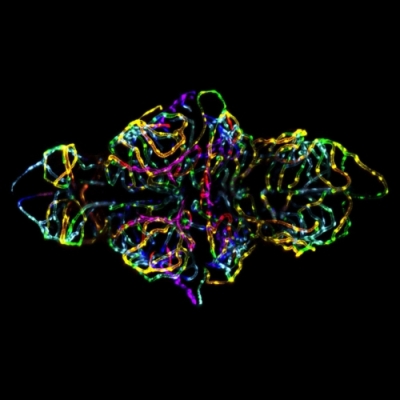Oct 24 2012
Among thousands of entries, Nikon has awarded its top honor to Jennifer Peters, Ph.D., and Michael Taylor, Ph.D., of St. Jude Children's Research Hospital for their photomicrograph, "The blood-brain barrier of a live zebrafish embryo." It is believed to be the first image showing the formation of the blood-brain barrier in a live animal.
 Among thousands of entries, Nikon has awarded its top honor to Jennifer Peters, Ph.D., and Michael Taylor, Ph.D., both of St. Jude Children's Research Hospital for their photomicrograph of the blood-brain barrier of a live zebrafish embryo. It is believed to be the first image showing the formation of the blood-brain barrier in a live animal. Nikon's Small World contest recognizes excellence in photomicrography, photographs made through a microscope. (PRNewsFoto/St. Jude Children's Research Hospital)
Among thousands of entries, Nikon has awarded its top honor to Jennifer Peters, Ph.D., and Michael Taylor, Ph.D., both of St. Jude Children's Research Hospital for their photomicrograph of the blood-brain barrier of a live zebrafish embryo. It is believed to be the first image showing the formation of the blood-brain barrier in a live animal. Nikon's Small World contest recognizes excellence in photomicrography, photographs made through a microscope. (PRNewsFoto/St. Jude Children's Research Hospital)
Nikon's Small World contest recognizes excellence in photomicrography, photographs made through a microscope. Nikon awarded its top award to Peters, an imaging scientist, and Taylor, an assistant member of the Department of Chemical Biology and Therapeutics, based on their image "that showcases the delicate balance between outstanding scientific technique and exquisite artistic quality," according to Nikon.
The first place winners from St. Jude partnered to capture the image that highlights their research of the blood-brain barrier. "We used fluorescent proteins to look at the brain endothelial cells and watched the blood-brain barrier develop in real-time," Peters said. "We took a three-dimensional snapshot under a confocal microscope and then stacked the images and compressed them into one, pseudo-coloring them in rainbow to illustrate depth."
"A better understanding of the highly complex blood-brain barrier is important for a number of reasons," Taylor said. "The blood-brain barrier regulates the passage of substances between blood and brain. Unfortunately, these properties also prevent the free exchange of many therapeutic agents, presenting a challenging problem for the treatment of neurological diseases. In addition, the blood-brain barrier is often disrupted in central nervous system diseases, including neurodegenerative disorders, brain tumors, stroke and diabetic retinopathy. New models of the blood-brain barrier, such as the transgenic zebrafish shown in our image, may lead to new treatments for these diseases."
According to Nikon, they received incredible images from around the world for the competition. "It is our privilege to honor and showcase these talented researchers and photomicrographers," said Eric Flem, communications manager at Nikon Instruments. "We are proud that this competition is able to demonstrate the true power of scientific imaging and its relevance to both the scientific communities, as well as the general public."
This year's judges were science and media industry experts including Daniel Evanko, editor, Nature Methods; Martha Harbison, senior editor, Popular Science; Robert D. Goldman, Ph.D., Stephen Walter Ranson professor and chair, Department of Cell and Molecular Biology, Feinberg School of Medicine at Northwestern University; and Liza A. Pon, Ph.D., professor of Pathology and Cell Biology and director, Confocal and Specialized Microscopy Shared Resource, Columbia University.
Top images from the 2012 Nikon Small World Competition will be exhibited in a calendar and a national museum tour.
Source: http://www.stjude.org